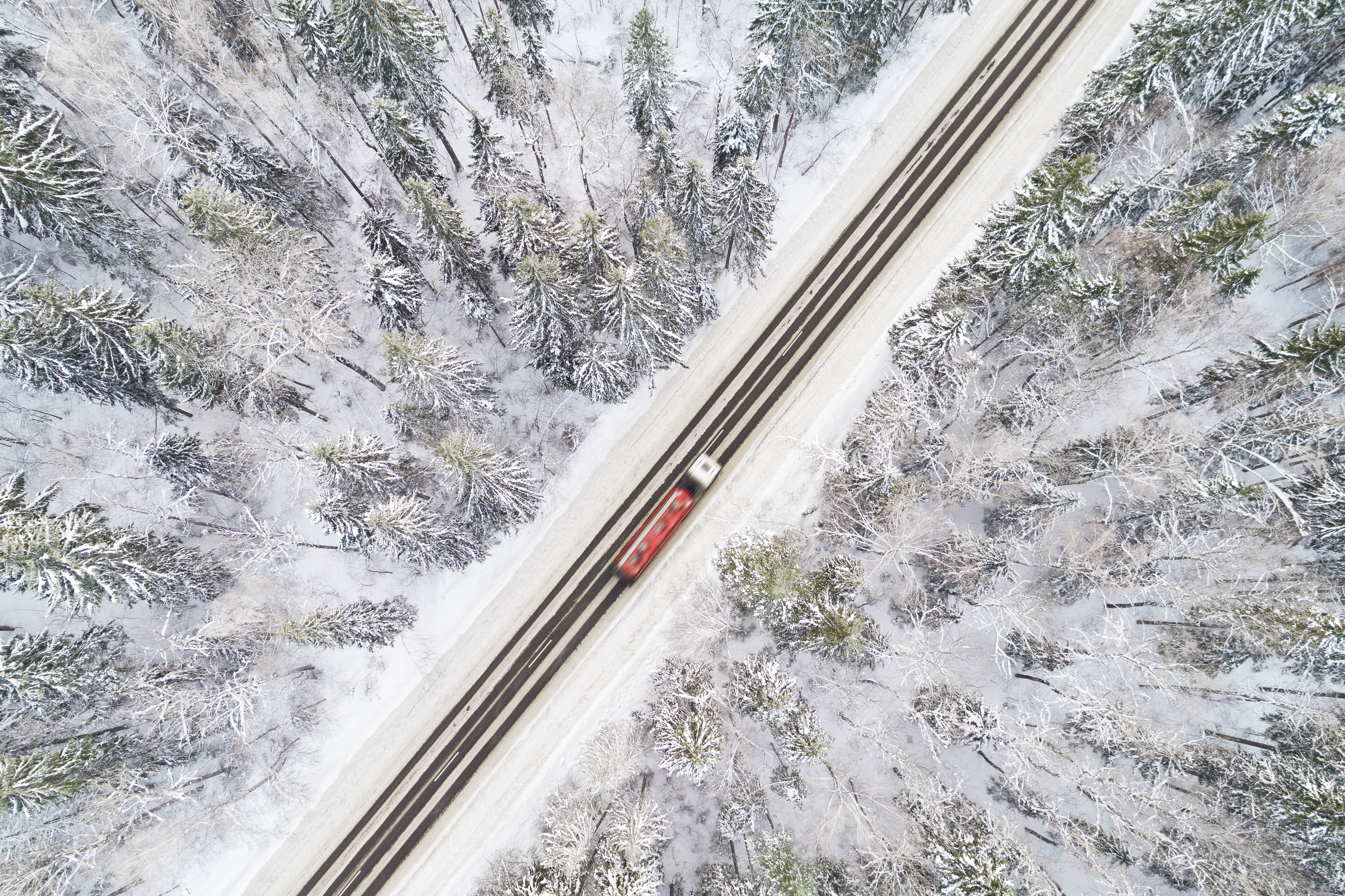
Miranda Blake
O guia de um camionista para o inverno na Europa
Criado: 16/10/2024
•
Atualizado: 03/03/2026
Os condutores de camiões enfrentam um conjunto único de desafios e responsabilidades nas estações mais frias. Verifica-se um aumento dos acidentes de viação graves, com [33% dos pedidos de indemnização apresentados durante este período considerados graves] (https://atha.co.uk/news/why-you-are-more-likely-to-have-a-severe-road-traffic-accident-in-the-winter).
Por isso, a preparação é crucial. Aqui, orientamos sobre como os condutores de camiões podem manter-se seguros na estrada e dentro da sua cabina neste inverno.
Navegar em condições de tempestade
É fundamental conduzir devagar e manter uma distância segura dos outros veículos - especialmente em zonas inundadas. Deve colocar o seu camião em baixa velocidade e manter o motor a trabalhar.
As dicas seguintes também ajudam a conduzir em tempo de tempestade.
- Se perder o controlo em águas superficiais, reduza a velocidade tirando o pé do acelerador - não tente travar ou guinar repentinamente.
- Os veículos mais altos são mais vulneráveis a ventos intensos - certifique-se de que segura bem o volante e evite as pontes sempre que possível.
- Viaje com as cortinas laterais abertas se o seu camião estiver vazio. Desta forma, há menos coisas para apanhar com o vento.
Gerir a neve e o gelo
Andar a um ritmo reduzido e manter a distância necessária em relação ao veículo da frente também é algo que deve fazer quando há gelo e neve. De facto, recomenda-se que se aumente a distância de travagem para 10 vezes o valor normal - no entanto, pode ser difícil avaliar isto. Um inquérito da Admiral concluiu que [o gelo negro causa 10% dos acidentes durante o inverno] (https://atha.co.uk/news/why-you-are-more-likely-to-have-a-severe-road-traffic-accident-in-the-winter). Pode saber se está a conduzir em gelo negro se a estrada parecer molhada mas não houver salpicos de outros veículos.
Outras dicas para o ajudar a conduzir na neve incluem a manutenção de inspecções regulares ao camião e a garantia de que tem todo o equipamento necessário antes da viagem, como cabos de ligação e ferramentas de degelo. Além disso, tenha sempre em atenção a mudança que deve utilizar, pois isso pode evitar que perca o controlo do seu camião. Em superfícies planas, conduza com a mudança mais alta possível. Nas descidas, utilize o travão motor e circule em mudanças baixas. Para evitar que as rodas girem, utilize uma mudança mais alta quando arrancar - isto dar-lhe-á a tração necessária para mover o veículo.

Garantir a visibilidade
Com estradas perigosas e factores externos a afetar negativamente a visão e a causar acidentes com camiões, a visibilidade é crucial em todas as condições meteorológicas, especialmente quando está mais frio. Por isso, certifique-se de que verifica se existem lascas ou fissuras no seu para-brisas, uma vez que estas podem espalhar-se mais rapidamente nos meses mais frios.
Além disso, é importante que as luzes, a matrícula e o para-brisas tenham o melhor nível de visibilidade possível. Para além de limpar a neve e a sujidade, é aconselhável lavar regularmente o seu veículo para evitar a acumulação de sal da estrada (que provoca a corrosão).
Se a visibilidade for fraca e as condições chegarem ao ponto de serem traiçoeiras, é melhor sair da estrada e descansar na paragem de camiões mais próxima. Se tiver de exceder as suas [horas de condução] (https://snapacc.com/newsroom/discover-the-new-drivers-hours-rules/), pode utilizar uma dispensa especial para condutores que se encontrem em circunstâncias únicas, como fenómenos meteorológicos extremos.
Avaliar a profundidade do piso do pneu
As baixas temperaturas também podem afetar a funcionalidade dos seus pneus, uma vez que podem provocar uma redução da pressão do ar. E, infelizmente, os pneus gastos aumentam a sua distância de paragem e reduzem o seu nível de estabilidade em estradas molhadas e geladas.
Por conseguinte, é aconselhável verificar a profundidade do piso antes de cada viagem em condições de tempestade ou outras condições adversas - desta forma, estará ciente de quando terá de lidar com quaisquer problemas que surjam.
Seguir os regulamentos relativos aos pneus de inverno
É também vital conhecer as diferentes regulamentações relativas aos pneus de inverno. Alguns países obrigam os condutores a transportar sacos de areia e pás, enquanto noutros as correntes de neve são obrigatórias. A Continental elaborou um [guia para os requisitos dos pneus de inverno] (https://www.continental-tyres.co.uk/b2c/tyre-knowledge/winter-tyre-laws/) simples para o Reino Unido e a Europa.
A partir de 1 de novembro, os pneus de inverno são obrigatórios:
- Áustria
- República Checa
- Finlândia
- França
- Lituânia
- Sérvia
Noutros países, são obrigatórios no final do mês ou em dezembro ou dependem das condições meteorológicas. Quanto aos pneus com pregos, embora sejam permitidos nos países abaixo indicados, existem regras estritas que os rodeiam. É melhor verificar os regulamentos de cada país antes da sua viagem.
- Áustria
- Bielorrússia
- Dinamarca
- Estónia
- Finlândia
- França
- Grã-Bretanha
- Letónia
- Liechtenstein
- Lituânia
- Noruega
- Espanha
- Suécia
- Suíça
- Turquia
- Ucrânia
Trazer os materiais necessários
Também tem de pensar na forma como pode cuidar de si no inverno. Isto parecerá óbvio, mas certifique-se de que tem acesso a comida e bebida suficientes. Com o aumento da probabilidade de encerramento de estradas durante as estações mais frias, nem sempre é possível chegar a uma paragem de camiões. Venha preparado com opções de lanches ou refeições e, idealmente, com uma bebida quente num frasco.
Especialmente se não tiver acesso a um local para descansar, assegure-se de que consegue manter-se quente. Por exemplo, leve consigo sacos térmicos recarregáveis. Da mesma forma, tenha sempre à mão roupa quente e sobresselente; isto será particularmente útil se as peças de vestuário ficarem frias e molhadas devido a tarefas como a remoção da neve do para-brisas.
O ideal é ter um kit de sobrevivência para o inverno - composto por alimentos, bebidas, um carregador de telemóvel portátil, uma lanterna, cobertores, um colete de alta visibilidade, uma pá e sapatos de caminhada resistentes.
Garantir o acesso a paragens de descanso com intruck
Embora as condições meteorológicas não estejam sob o seu controlo, proteger-se a si e aos outros na estrada está. Isto inclui certificar-se de que tem um local seguro e protegido para estacionar o mais rapidamente possível. A nossa aplicação intruck ou [página de mapas] (https://snapacc.com/map/) indica-lhe os prestadores de serviços mais próximos, bem como informações sobre as instalações que cada um oferece.
Pode descarregar a aplicação intruck hoje mesmo clicando [nesta ligação] (https://intruckapp.com/download/).


